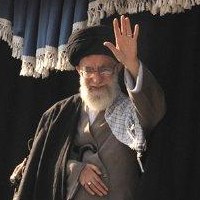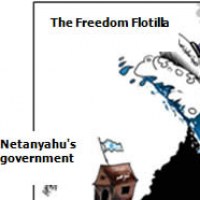![]()
Sun, Dec 26, 2010 | The Meir Amit Intelligence and Terrorism Information Center
Uproar Over Foreign Minister Mottaki’s Sacking Continues
A group of 16 Majles members submitted a written address to President Ahmadinejad this week criticizing the manner in which Foreign Minister Manouchehr Mottaki had been fired last week. In the address, the Majles members demanded that the president provide clarifications about his dismissal while on an official visit to Africa.
Majles member Ali Motahhari said that the sacking had been done in a dubious manner, and that the president owes the public an explanation why it was a matter of such urgency to lay off Mottaki during an official trip, and why he had to hear the news from the president of Senegal. Motahhari claimed that the manner in which the minister had been fired compromised Iran’s international status as well as Mottaki’s personal dignity. He noted that the Majles intended to continue discussing the issue (Khabar Online, December 19).
Meanwhile, this week Mottaki denied remarks made by First Vice President Mohammad Reza Rahimi, who claimed that the decision to relieve him of duty had been agreed upon by the former foreign minister and the president even before Mottaki’s trip to Senegal. Mottaki defined his sacking as humiliating, un-Islamic, and diplomatically unacceptable.
Majles speaker Ali Larijani also criticized the foreign minister’s abrupt dismissal. Speaking at the beginning of the weekly Majles session on Sunday, Larijani said that the minister could have been relieved of duty in a dignified manner instead of during a trip abroad (various news agencies, December 19).
Ali Akbar Salehi’s inauguration ceremony as acting foreign minister was held this week. At the ceremony, which was not attended by the dismissed foreign minister, Salehi laid out fundamental principles of the Foreign Ministry for the near future. He said that Iran’s foreign policy had to focus on its neighbors and on Muslim countries. In particular, he mentioned Saudi Arabia and Turkey as two countries that required special attention from Iran due to their unique regional status. Saudi Arabia is a key player in world economy and is home to numerous Islamic holy sites. According to Salehi, cooperation between Saudi Arabia and Iran may help resolve regional and Muslim world problems. On the subject of Turkey, Salehi said that the two countries were cultural and ideological partners. Turkey is a strong, strategically-significant country, and bolstering ties with it would be beneficial for the Muslim world. Salehi further stated that the status of China and Russia was special as well, and that the ties between the two countries and Iran called for particular political attention.
Speaking about the relations with the European Union, Salehi said that despite its irrational and biased conduct towards Iran, the EU countries still wished to have stable relations with Iran for various reasons. If Turkey joins the EU, Salehi said, Iran will become the EU’s largest neighbor, making it necessary to start laying the political groundwork for such a scenario (IRNA, December 18).
Ali Akbar Javanfekr, the president’s media advisor, commented on Mottaki’s dismissal this week saying that the Foreign Ministry had to be majorly restructured in light of the recent changes in senior Foreign Ministry staff. Javanfekr, also the director of IRNA, the government’s news agency, said that the Mottaki-led Foreign Ministry had failed in its attempts to achieve a breakthrough in foreign policy in recent years, and that all the achievements made by Iran in its foreign policy had to do with initiatives led by President Ahmadinejad and his active presence on the international scene. Javanfekr noted that Mottaki was supposed to carry out the tasks he had been entrusted with by the president, and that he had been dismissed because of his failure to do so. He expressed hope that following the dismissal, the Foreign Ministry would attain the foreign policy objectives set by the president and his government (IRNA, December 18).
This week, Iranian commentators continued to discuss the potential implications of Mottaki’s dismissal on the Iranian foreign policy. Rahman Ghahremanpour, a journalist and foreign policy expert for the Expediency Discernment Council’s research center, said in an interview given to the Fararu website that the appointment of Salehi as acting foreign minister would have no impact on Iran’s foreign policy, which was independent of personal matters. He said that foreign policy was decided upon by the topmost echelons of the regime, and staff changes were unlikely to bring about any fundamental changes in foreign policy. He did note that the Foreign Ministry may play a more significant part than before in the nuclear talks in Istanbul, to be resumed in the near future (Fararu, December 18).
It was also the assessment of the daily Ebtekar that Salehi’s appointment would cause no strategic change in the nuclear policy. It may, however, result in greater coordination of the Iranian diplomatic apparatus, allowing it to better serve national interests (Ebtekar, December 18). The conservative daily Siyasat-e Rouz interviewed several experts this week about the potential impact of Mottaki’s dismissal on Iranian diplomacy. Various experts on international affairs commented that the minister’s dismissal would have no effect on the nuclear negotiations, since it was the responsibility of the Supreme National Security Council rather than the Foreign Ministry. The only likely change, according to one expert, is that the president will exercise more control over the Foreign Ministry (Siyasat-e Rouz, December 19).



 RSS
RSS











Uproar Over Foreign Minister Mottaki's Sacking Continues | #Iran http://j.mp/fXJSDq
Uproar Over Foreign Minister Mottaki's Sacking Continues | #Iran http://j.mp/fXJSDq
RT @CrethiPlethi: Uproar Over Foreign Minister Mottaki's Sacking Continues | #Iran http://j.mp/fXJSDq